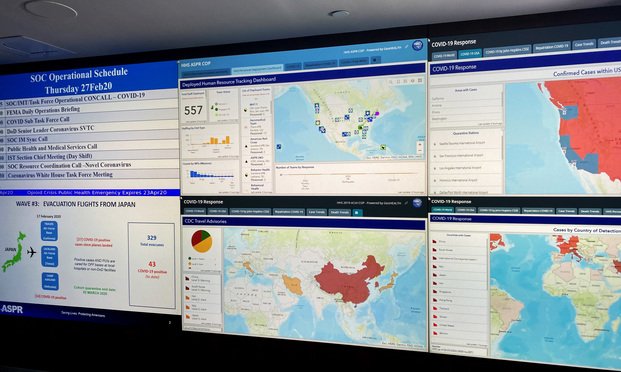California Courts Have Epidemic Playbook as Coronavirus Spreads
Judge Joyce Hinrichs of Humboldt County Superior Court, chair of a Judicial Council committee of presiding judges, said the coronavirus is a major topic of discussion among her colleagues. Some federal courts in Washington state were curtailing operations.
March 06, 2020 at 05:07 PM
5 minute read
The original version of this story was published on The Recorder
 The primary emergency operations center for HHS. Photo: White House
The primary emergency operations center for HHS. Photo: White House
California's state courts remained open and operating near normally Friday as judges and court executives grappled with how to respond to the outbreak of the respiratory illness COVID-19.
Judge Joyce Hinrichs of Humboldt County Superior Court, chair of a Judicial Council committee of presiding judges, said the coronavirus is a major topic of discussion among her colleagues, who are trying to balance safety concerns for the public and court employees with the need to maintain judicial operations.
"We're being vigilant," Hinrichs said while attending a previously scheduled conference of presiding judges and court executives, but "we don't want to be part of any hysteria."
More than a dozen deaths in the U.S., the bulk of them in Washington state, have been attributed to the coronavirus outbreak, as the number of infected patients globally soared past 100,000 Friday.
Federal courts in western Washington state on Friday said they were suspending all civil and criminal matters requiring an in-court appearance. The order, in effect at least until March 31, does not impact judges' considerations of civil or criminal matters that can be resolved on court filings without oral argument. The courthouses in Seattle and Tacoma remain open. Meanwhile, the U.S. Court of Appeals for the Ninth Circuit on Friday said it was cancelling en banc hearings for the week of March 9.
"In light of the concerns about community spread of the COVID-19 virus throughout the Circuit, the Court has cancelled its en banc hearings and all non-case related meetings scheduled for the week of March 9th," the court said. "At the discretion of the three-judge panels, there may be additional cancellations for next week as well."
The California Department of Public Health reported 60 positive cases of COVID-19 and one related death as of Thursday at 10 a.m., the most recent time the state made figures available. Some schools have closed and in Santa Clara County, home to 20 reported cases, public health officials have recommended canceling large public gatherings and keeping employees at "an arm's-length" distance in the workplace.
California courts have a blueprint available for responding to a disease outbreak. In 2006, the agency known then as the Administrative Office of the Courts released "Epidemics and the California Courts" after a public scare over the so-called bird flu. The 39 pages of guidance recommends that judges stay " aware of the authority of health officials, as well as of constitutional implications of quarantine, isolation, and court closure."
"Each of us plays a vital role in controlling, containing, and mitigating the effects of an outbreak. California courts now have an opportunity to prepare to fight this potentially devastating disaster," the report stated.
Gov. Gavin Newsom this week declared a state of emergency in California, but it does not mandate any quarantines or court closures.
Court executives should make "court personnel aware of the procedure for requesting Judicial Emergency Orders," the guidance says, while "considering implementing protocols that address how persons who are subject to quarantine or isolation may continue to access court resources or legal counsel."
California law, updated in 2018, gives the chief justice broad powers to act in an epidemic or "public calamity." She can authorize courts to hold sessions anywhere in their home county, to transfer civil cases to another location within 100 miles of the county, to declare a "holiday" for the purpose of calculating certain filing deadlines and to extend the time in which a criminal trial must be held.
The outbreak has highlighted the decentralized relationship between California's trial courts and the central judicial administration. Chief Justice Tani Cantil-Sakauye has not issued any orders related to the coronavirus, nor has she released any public statements.
The Judicial Council recently sent a memo to courts saying leaders are monitoring the situation and urging judges to monitor public health reports for information. Administrative Director Martin Hoshino was expected to send another message to courts Friday.
The administrative unit that produced the 2006 "epidemic" guidebook is still in existence and "responding to questions and sending out information" to courts, a Judicial Council spokesman said.
Representatives of courts in counties where COVID-19 has been reported said they had ordered extra cleanings of public rooms and urged employees and potential jurors to stay home if they showed any symptoms of illness. Nearly nine million Californians are summoned for jury service every year.
"There is no indication that fewer jurors or attorneys are showing up for court," said Mary Hearn, spokesman for the Los Angeles County Superior Court, the largest state court system in the nation. "However, the Court is taking steps to plan for potential disruptions and is actively receiving important timely updates from the Los Angeles Department of Public Health and the Judicial Council."
Jake Chatters, executive officer of the Placer County Superior Court, said court leaders are evaluating options to typical court appearances, including increasing telephone conferences. The only known COVID-19 death was reported in Placer County.
Read more:
Cancellations, Crisis Planning and Clorox: COVID-19 Strikes Legal Community
Coronavirus Chills West Coast's In-House Hiring Market Following 2019 Surge
More Big Law Firms Respond as the Coronavirus Continues to Spread Globally
NOT FOR REPRINT
© 2025 ALM Global, LLC, All Rights Reserved. Request academic re-use from www.copyright.com. All other uses, submit a request to [email protected]. For more information visit Asset & Logo Licensing.
You Might Like
View All
Trump's DOJ Delays Releasing Jan. 6 FBI Agents List Under Consent Order
3 minute read
Judge Grills DOJ on Trump’s Birthright Citizenship Executive Order

Perkins Coie Backs Challenge to Trump's Ban on Transgender Military Service
4 minute read
Selendy Gay Files Lawsuit Challenging Trump's Workforce Reclassification EO
2 minute readTrending Stories
- 1How Alzheimer’s and Other Cognitive Diseases Affect Guardianship, POAs and Estate Planning
- 2How Lower Courts Are Interpreting Justices' Decision in 'Muldrow v. City of St. Louis'
- 3Phantom Income/Retained Earnings and the Potential for Inflated Support
- 4Should a Financially Dependent Child Who Rejects One Parent Still Be Emancipated?
- 5Advising Clients on Special Needs Trusts
Who Got The Work
J. Brugh Lower of Gibbons has entered an appearance for industrial equipment supplier Devco Corporation in a pending trademark infringement lawsuit. The suit, accusing the defendant of selling knock-off Graco products, was filed Dec. 18 in New Jersey District Court by Rivkin Radler on behalf of Graco Inc. and Graco Minnesota. The case, assigned to U.S. District Judge Zahid N. Quraishi, is 3:24-cv-11294, Graco Inc. et al v. Devco Corporation.
Who Got The Work
Rebecca Maller-Stein and Kent A. Yalowitz of Arnold & Porter Kaye Scholer have entered their appearances for Hanaco Venture Capital and its executives, Lior Prosor and David Frankel, in a pending securities lawsuit. The action, filed on Dec. 24 in New York Southern District Court by Zell, Aron & Co. on behalf of Goldeneye Advisors, accuses the defendants of negligently and fraudulently managing the plaintiff's $1 million investment. The case, assigned to U.S. District Judge Vernon S. Broderick, is 1:24-cv-09918, Goldeneye Advisors, LLC v. Hanaco Venture Capital, Ltd. et al.
Who Got The Work
Attorneys from A&O Shearman has stepped in as defense counsel for Toronto-Dominion Bank and other defendants in a pending securities class action. The suit, filed Dec. 11 in New York Southern District Court by Bleichmar Fonti & Auld, accuses the defendants of concealing the bank's 'pervasive' deficiencies in regards to its compliance with the Bank Secrecy Act and the quality of its anti-money laundering controls. The case, assigned to U.S. District Judge Arun Subramanian, is 1:24-cv-09445, Gonzalez v. The Toronto-Dominion Bank et al.
Who Got The Work
Crown Castle International, a Pennsylvania company providing shared communications infrastructure, has turned to Luke D. Wolf of Gordon Rees Scully Mansukhani to fend off a pending breach-of-contract lawsuit. The court action, filed Nov. 25 in Michigan Eastern District Court by Hooper Hathaway PC on behalf of The Town Residences LLC, accuses Crown Castle of failing to transfer approximately $30,000 in utility payments from T-Mobile in breach of a roof-top lease and assignment agreement. The case, assigned to U.S. District Judge Susan K. Declercq, is 2:24-cv-13131, The Town Residences LLC v. T-Mobile US, Inc. et al.
Who Got The Work
Wilfred P. Coronato and Daniel M. Schwartz of McCarter & English have stepped in as defense counsel to Electrolux Home Products Inc. in a pending product liability lawsuit. The court action, filed Nov. 26 in New York Eastern District Court by Poulos Lopiccolo PC and Nagel Rice LLP on behalf of David Stern, alleges that the defendant's refrigerators’ drawers and shelving repeatedly break and fall apart within months after purchase. The case, assigned to U.S. District Judge Joan M. Azrack, is 2:24-cv-08204, Stern v. Electrolux Home Products, Inc.
Featured Firms
Law Offices of Gary Martin Hays & Associates, P.C.
(470) 294-1674
Law Offices of Mark E. Salomone
(857) 444-6468
Smith & Hassler
(713) 739-1250








